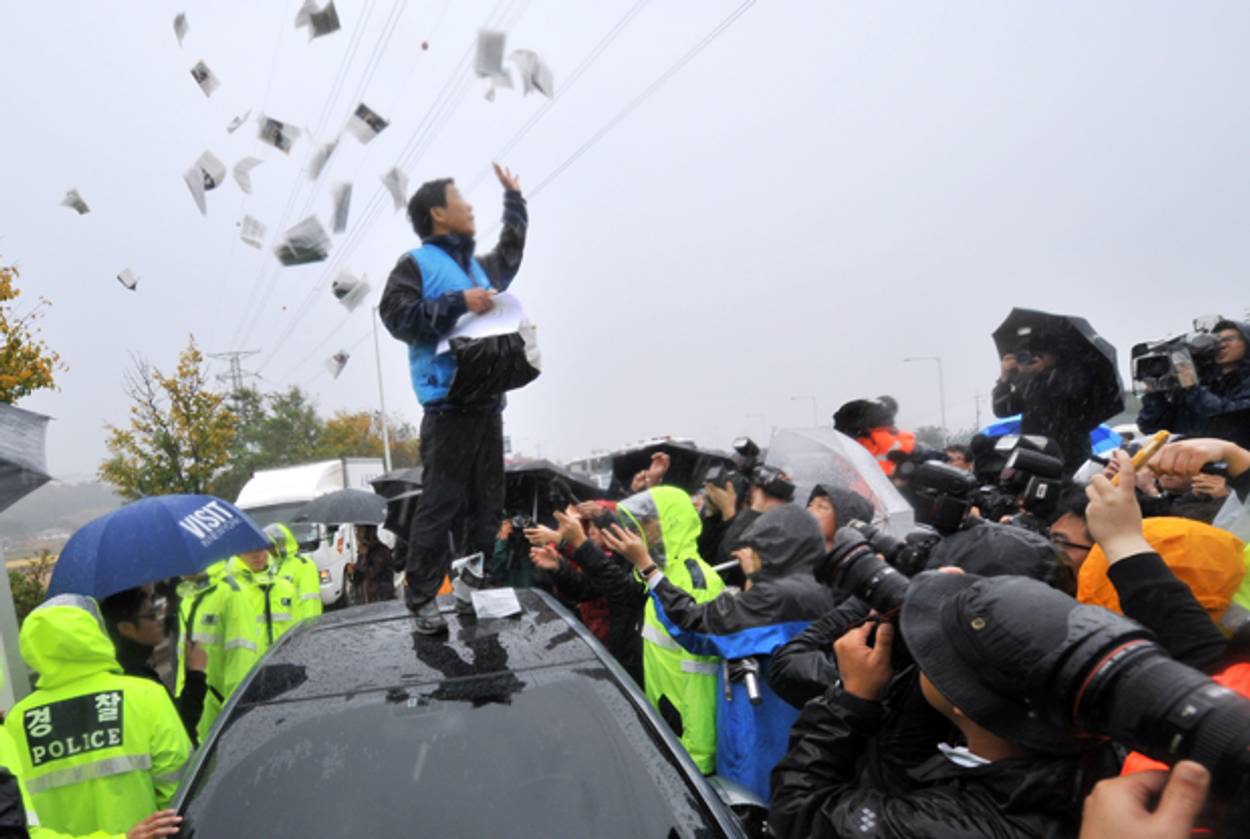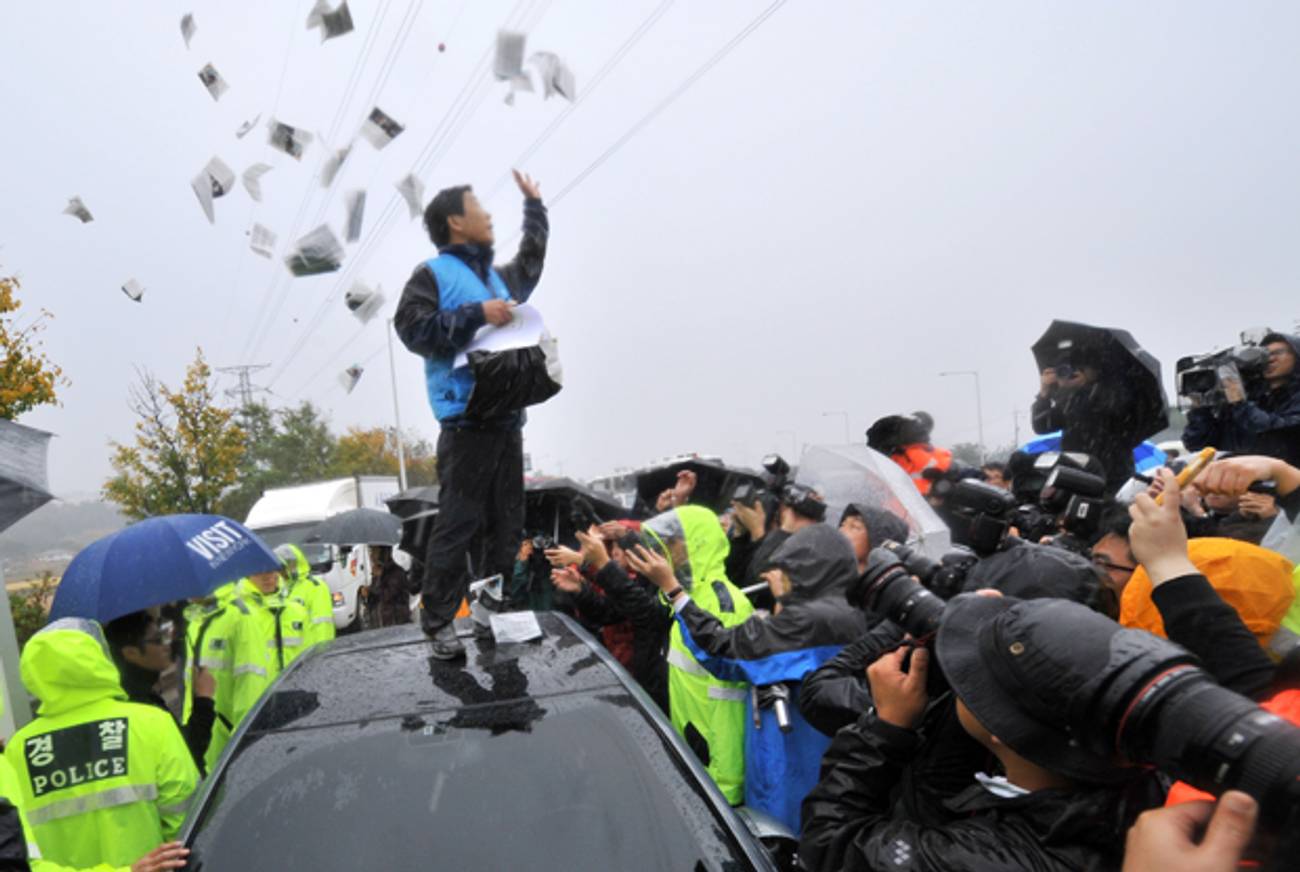Slavery in the 21st Century
A new book, Escape From North Korea, says the Korean diaspora should emulate the movement to free Soviet Jewry




One of the many squalid corners of the world documented by the late Christopher Hitchens was North Korea, where he traveled in 2000. In 2005 he reflected that “not even in the lowest moments of the Third Reich, or of the gulag, or of Mao’s ‘Great Leap Forward,’ was there a time when all the subjects of the system were actually enslaved”—yet such is the case in North Korea. Hitchens wrote that “the human rights movement, hitherto unpardonably tongue-tied about all this, should insistently take up the case of North Korea and demand that an underground railway, or perhaps even an overground one, be established. Any Korean slave who can get out should be welcomed, fed, protected, and assisted to move to South Korea.”
It turns out that an underground railway exists—it had just never been described with power and precision. It finally has been, in Melanie Kirkpatrick’s new book, Escape From North Korea: The Untold Story of Asia’s Underground Railroad, which chronicles the perilous, sometimes fatal journeys of the rare individuals who escape North Korea’s hell and the heroic Christian activists, students, and average Americans who aid them. A former editor at the Wall Street Journal editorial page, Kirkpatrick does the kind of work that many human-rights activists don’t: reporting on a closed society. The late New York Sen. Daniel Patrick Moynihan once wrote, “The amount of violations of human rights in a country is always an inverse function of the amount of complaints about human rights violations heard from there.” How true that is with North Korea. But through rigorous reporting about “freedom-seekers and their rescuers,” Kirkpatrick brings the brutality of the Hermit Kingdom to life by telling the stories of real people.
***
Consider Kim Cheol Woong, 38, once the first pianist of the Pyongyang Philharmonic Orchestra. When a colleague heard Kim practicing romantic ballads and the jazz piece “Autumn Leaves”—music unsanctioned by the North Korean regime—Kim was reported to the Ministry of State Security and forced to write a 10-page apology and self-criticism. This was it for Kim, who had had been closely monitored for years, denied the right to play certain composers like Sergei Rachmaninoff, and forced to attend weekly self-criticism sessions at the North Korean embassy while studying abroad in Moscow. In December 2001 he decided to flee over the Tumen River in a midnight escape to China. “My motivation to escape was not hunger, but to be able to play freely the music of my choice,” he told Kirkpatrick. (As famed American jazz pianist Dave Brubeck said after a visit to Warsaw in 1958: “No dictatorship can tolerate jazz. It is the first sign of a return to freedom.”)
Kim paid a guide in the northeast part of the country $2,000 to lead him to China. Once there, he worked in a small town as a farmer and logger, and for seven months he did not touch a piano. But he never stopped looking. One day, Kim was directed by another North Korean refugee to a decrepit church piano, with 30 of the 80 keys out of commission. “I could hear the missing notes in my head. I finally felt like I was alive,” he remembers.
After a year in China, desperate to complete his journey to freedom, Kim bought a forged South Korean passport on the black market and tried to fly to Seoul. He was caught by immigration authorities on his way out at the Beijing airport and spent three months in a Chinese prison; he protected his fingers during savage beatings by stuffing them under his armpits. As they do with almost all North Korean refugees, the Chinese put Kim on a train back to North Korea. Amazingly, the pianist managed to leap from the train.
Two months later, Kim was again detained in China as he tried to cross into Mongolia, this time pretending to be a Chinese tourist. After another half-year in Chinese detention and another deportation to North Korea, the pianist tried for a third escape with another forged South Korean passport. This time, the Chinese authorities bought it. Kim, who now lives in South Korea, has traveled the world telling his story and playing the music of his choice.
There are an estimated 24,000 North Koreans who, like Kim, have fled to safety in South Korea, North America, and Europe. The highest-profile defector of all time, profiled by Kirkpatrick, is Hwang Jang Yop, who once served as chairman of the Supreme People’s Assembly (North Korea’s parliament) and president of Kim Il Sung University. He authored the regime’s juche philosophy of self-reliance, which in 1972 “replaced Marxism-Leninism as the official state ideology.” Yet even at that level of seniority, Hwang was forced to write self-criticisms about his ideological transgressions, such as praising market reforms in China.
On a trip to China in 1997, after months of planning, the old regime stalwart found a small window to slip away. On a shopping trip at the Great Wall Mall, Hwang sent his ever-present minders on a brief errand. He quickly sped away in a taxi to the South Korean embassy. Until his death in 2010, Hwang dedicated his life to talking about the dangers of the North Korean dictatorship and survived several assassination attempts.
Like all defectors, Hwang paid a heavy price for fleeing. “More than three thousand of his family members, friends, and associates were arrested, including distant relatives who had no idea they were even related to the defector,” Kirkpatrick writes. “Hwang’s wife was said to have committed suicide. So, too, the reports said, did one of his daughters. She was said to have jumped off a bridge to her death while being transported to a prison camp. Two other daughters, his son, and his grandchildren were lost in the gulag.”
***
The escapes of defectors like Kim and Hwang are often arranged by an informal network of aid workers, missionaries, and North Korean ex-pats. It is all part of the Underground Railroad in which bribes are paid, transportation is arranged, food is provided, medicine is transferred, and documents are forged. This help can mean the difference between life and death.
Christians take the lead. “The first survival tip a North Korean learns when he reaches China is: Find a Christian,” Kirkpatrick writes. “Churches in northeastern China are meeting grounds for refugees and rescuers. … The sooner a refugee hooks up with the Christian network, the greater his chances of avoiding arrest and repatriation and of finding a way to disappear in Chinese society.”
American pastors and churches aid them and play a major role in facilitating this network, quietly reaching out to those still living in North Korea. Some are brave enough to sneak into North Korea under assumed identities, others liaison with handlers, smuggle money across the border, or run safe-houses in China.
Once free, these defectors also need work, counseling, housing, and supportive communities. Of the 128 North Korean refugees who have received political asylum in the United States between 2006 and early 2012, eight now serve as parishioners at Hana Presbyterian Church in Beltsville, Md. Pastor Phillip Buck, based in Seattle, has led more than 100 North Korean refugees out of China. He runs a network of safe-houses throughout China and raises money to feed refugees and bring them to secure locations. Individuals like Lee Jun Won, who runs a hair salon in Queens, gave $10,000 to rescue a single North Korean family of refugees when his church took up their cause. “The numbers are small,” writes Kirkpatrick, “but they add up.” Meantime, groups such as the Korean-Church Coalition, which consists of more 2,500 Korean-American pastors, serve as force multipliers in the effort to save North Korean refugees.
These Christians are rightly disgusted by North Korea’s systematic attempts to root out any worship that isn’t directed at the ruling family. Those found to be practicing Christianity or possessing a Bible are typically sent to the gulag. But Kirkpatrick points out that the story is more complicated. Some argue that these Christians’ desire to spread their faith puts North Korean lives in danger. But Kirkpatrick writes, “It would be a mistake to dismiss North Korean converts as mere ‘rice Christians,’ the cynical label applied to converts in pre-Mao Zedong China who were presumed to have accepted a strange Western religion solely for the purpose of receiving the benefits provided by the missionaries.” Indeed, religion serves as a great hope to many who have known nothing but the cynical cult of personality of the North Korean dictator.
***
When I was an undergraduate at UCLA, I went to hear a lecture by Adrian Hong, co-founder of a group called Liberty in North Korea, who later was imprisoned in China for trying to ferry North Korean refugees to safety. I was one of only two non-Asians in the packed hall. It was a great shame, I remembered thinking, that more students—especially on such a political campus—were not fired up about this modern slave state.
Kirkpatrick argues that the Korean community could do much more to draw attention to North Korean refugees and would do well to learn from the Jewish effort to save Soviet dissidents from the former Soviet Union. “There is one lesson in particular from that era that Korean-American activists would be smart to emulate,” she writes. “The movement to free Soviet Jews began as a grassroots effort far removed from the elites of Jewish society. It started in 1963 not with national Jewish leaders of even with rabbis. Instead, it began with a petition organized by two Jewish laymen in Cleveland, Ohio.”
Moreover, “[T]he struggle to help Soviet Jews attracted supporters from every part of Jewish life—religious leaders, politicians [and] businessmen. But the salient fact is that it began with ordinary citizens who were outraged enough to take action. This kind of bottom-up approach will not come naturally to Korean-Americans brought up in a culture that reveres age and experience.”
The movement to free Soviet Jewry galvanized the broader world by putting the fate of individual Jews in the spotlight. Not only were the press and public made aware of the fates of particular men and women, American policy was often oriented around them. One former senior American official told me that he brought up the names of Natan Sharansky, Andrei Sakharov, and Yuri Orlov in every bilateral arms negotiation he conducted with the Soviets. This experience can and should be replicated with North Korea.
Kirkpatrick concludes with a glimmer of hope in an otherwise heartbreaking saga. “An invasion of North Korea has already begun,” she writes. “No soldiers of ranks are involved, and not a single bullet will be fired. Rather, the weapons are cellphones, radios, flash drives, DVDs, and videotapes. It is an information invasion, not a military one, and the strategic objectives are far-reaching: Open the country to information from the outside world, nurture dissent, destroy the Kim family regime.”
***
Like this article? Sign up for our Daily Digest to get Tablet Magazine’s new content in your inbox each morning.
David Keyes is the executive director of Advancing Human Rights, co-founder of CyberDissidents.org, and a contributor to Newsweek/The Daily Beast.
David Keyes is the executive director of Advancing Human Rights, co-founder of CyberDissidents.org, and a contributor to Newsweek/The Daily Beast.